In this article:
Toddlers often suffer from gas build up which releases through flatulence and burping. This is rarely a cause for concern but when the gas does not pass easily, it results in pain and other symptoms that parents would understandably want to alleviate as quickly as possible.
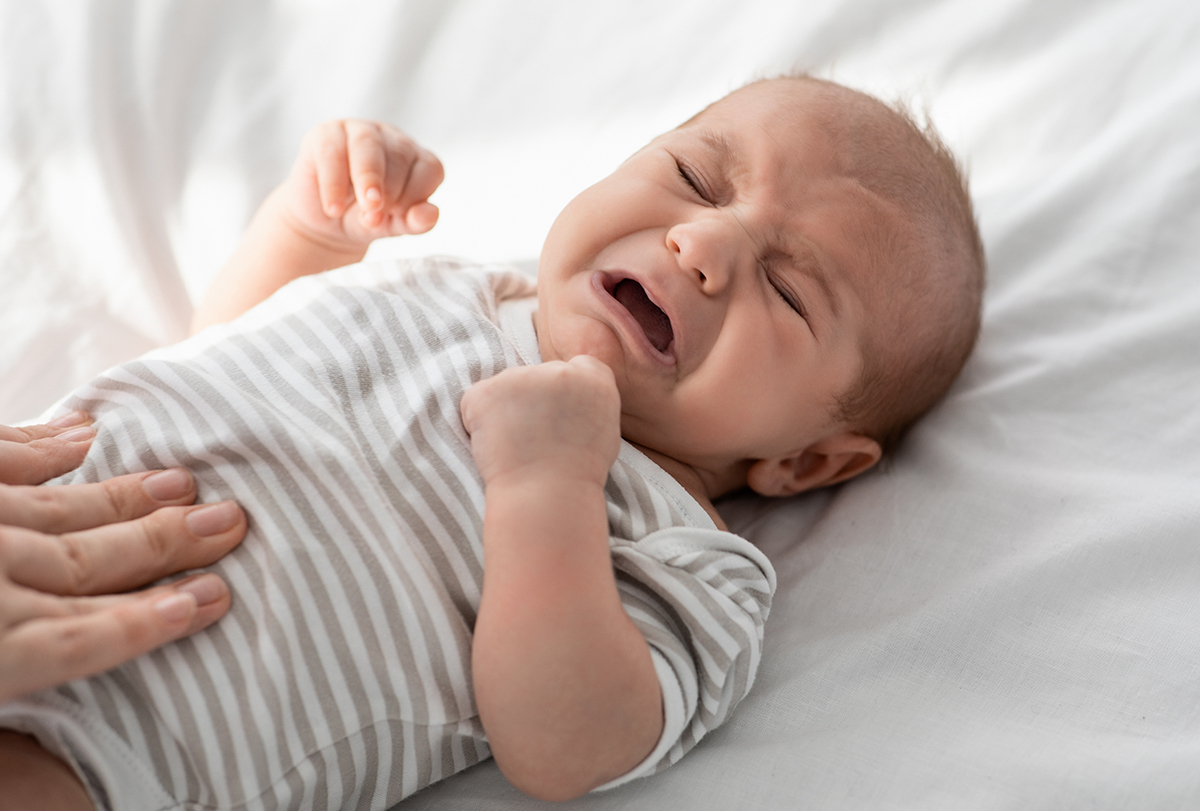
Causes of Gas Problems in Toddlers
The causes of gas problems in toddlers include the use of antibiotic medications, lactose intolerance, consuming foods that increase flatulence, not chewing the food thoroughly, swallowing a large amount of air while eating or drinking, and not drinking enough water. (1)
Symptoms of Gas Problems in Toddlers
Signs of gas in a toddler may include being more fussy than usual, drawing his/her legs up towards the belly, decreased appetite, difficulty sleeping, or difficult bowel movements.
You may also notice more flatulence and burping than usual.
Get Rid of Gas Pain in Toddlers
Here are some home remedies for gas pain in toddlers.
1. Eliminate the triggers
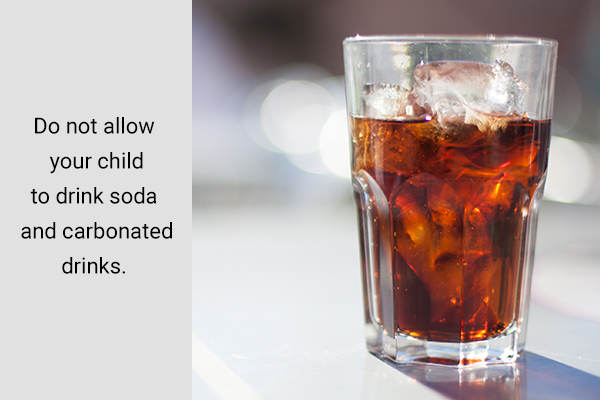
Certain foods may make your child to be more prone to gas and stomach pain. In this case, you would need to identify and eliminate these food items from your child’s diet.
- Check if your child is lactose intolerant. This occurs when you are unable to digest the sugar in dairy. As it may be the cause of abdominal pain in your child. (2)
- Some foods that can cause gas are cabbage, kale, cauliflower, broccoli, beans, onions, peas, pears, peaches, and prunes. Avoid feeding your child these common trigger foods.
- Do not allow your child to drink soda and carbonated drinks.
- Breastfeeding mothers should avoid spicy foods, beans, and cruciferous vegetables (such as cauliflower and broccoli) if their baby is experiencing gas.
2. Include more fiber-rich foods in the diet
To prevent gas from developing, include fiber-rich foods in your child’s diet. Fiber aids the digestion process by helping the food move faster through the intestines. (3) It also helps prevent constipation.
- Some of the best fiber-rich foods that you can include in the diet of your children are bran, whole grains, berries, celery, squash, and oranges.
- Avoid giving your child too many refined and processed foods, which have had the natural fiber removed from them.
Breastfeeding mothers should also include fiber-rich foods in their diet.
3. Increase the fluid intake
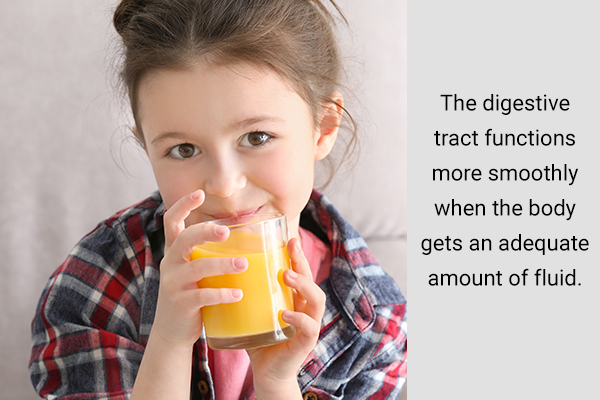
If your child suffers from gas pain, increase his/her fluid intake. The digestive tract functions more smoothly when the body gets an adequate amount of fluid. It will also help expel gas and prevent constipation.
If the child is not having sufficient amount of fluid in the diet, then it could result in the symptoms of constipation. (4)
- Make sure that your child drinks enough water throughout the day. If possible, give your child warm water to drink as it aids digestion.
- In addition to water, you can also give fresh fruit juice and clear broth to your child.
- You can give flavored water to your child, but only after consulting your doctor.
Avoid giving your child fizzy drinks like soda that can worsen the condition.
4. Give a gentle massage
Massage is another good option for providing relief to the toddler suffering from gas pain, as massaging the stomach will help move the trapped gas out of the intestine. (5)
How to do:
- Rub some warm olive or coconut oil on your hands.
- Gently massage the toddler’s tummy in a clockwise direction for 2 to 3 minutes.
- Then massage the back for 2 minutes to help relieve gas and promote sleep.
- Repeat several times a day.
5. Exercise
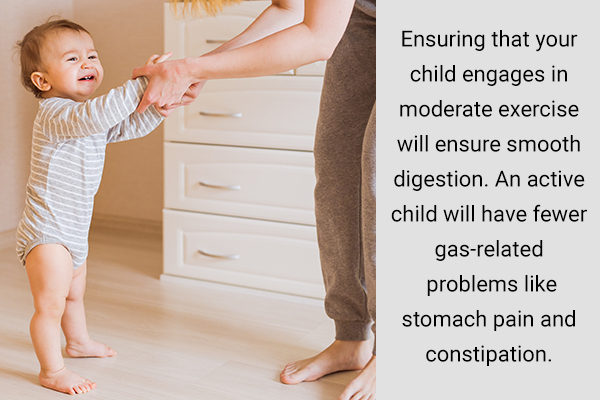
Ensuring that your child engages in moderate exercise will also ensure smooth digestion. An active child will have fewer gas-related problems like stomach pain and constipation.
- For infants, exercise your child’s legs in a gentle cycling motion between feedings. This creates pressure on the stomach to help expel gas.
- Encourage your child to engage in moderate exercises like walking, running, jogging, and dancing.
However, there should be a gap of at least one hour between feeding and exercise. Also, do not allow your child to lie down immediately after eating.
6. Use a warm compress
A warm compress can bring immense relief from gas pain in toddlers as the warm temperature will help expel the gas and give relief to the baby.
How to use:
- Soak a soft towel in hot water and squeeze out the excess water.
- Place the warm towel on your child’s tummy.
- When the towel cools down, replace it with a new warm one.
- Repeat the process 3 or 4 times.
- Use this remedy a few times a day.
Note: Avoid using a hot water bottle or heating pad for children.
7. Chamomile
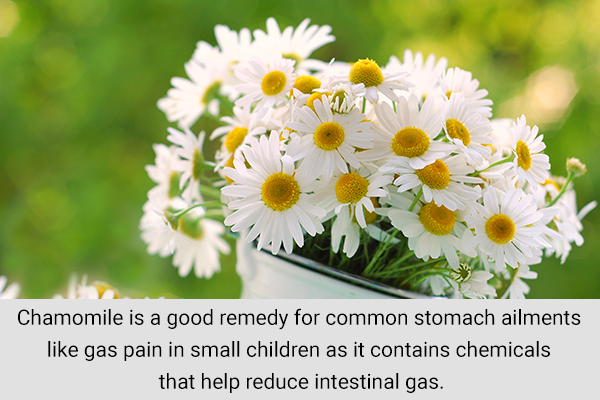
Chamomile is a good remedy for common stomach ailments like gas pain in small children as it contains chemicals that help reduce intestinal gas. (6) This herb also helps relax the muscles in the digestive tract, in turn improving digestion and preventing gas formation.
How to use:
- Add ½ teaspoon of dried chamomile flowers to a cup of hot water.
- Cover and steep for 10 minutes.
- Give your child 1 to 2 teaspoons of this tea several times a day.
Breastfeeding mothers can drink a cup of chamomile tea 2 or 3 times a day.
Additional Tips to Manage and Prevent Gas Problems in Toddlers
- Do not overfeed your child.
- If breastfeeding, burp your child often.
- If your child has gas pain after having milk products, talk to your doctor about lactose intolerance.
- Breastfeeding mothers should pay attention to their diet and avoid foods that contribute to gas.
- Reduce the amount of air your child swallows by asking him to eat more slowly.
- Teach your child to chew food thoroughly before swallowing.
- Have your child lay down on his left side to help ease the gas pain.
- Gently hold your child’s feet up for a few minutes to help expel stomach gas.
- Do not allow your child to chew gum, suck on hard candies or drink through a straw if he is prone to gas or experiencing gas pain.
- Slowly introduce probiotics into your child’s diet to improve digestion and prevent gas.
- Give your child enzyme-rich foods like 1 or 2 slices of pineapple, grapefruit, or papaya to improve digestion.
- Do not give any medicine to your child without first consulting a doctor.
When to See a Doctor
If the symptoms of gas pain occur after every meal or are quite frequent and prolonged then you need to consult the doctor. If gas pain is associated with any other symptoms such as vomiting, diarrhea, poor appetite, or weight loss, you may need to see your doctor.
Your child may also need medical attention if he/she does not find any relief within a week of using any of the below-given home remedies as there might be an underlying cause responsible for the child’s discomfort.
Final Word
Infants have an underdeveloped digestive system which makes them prone to gas problems. The buildup of gas inside their little tummies can cause a lot of pain and discomfort which is hard for any parent to see.
But fortunately, a few simple tips and remedies can help release the excess gas and comfort your baby.
- Was this article helpful?
- YES, THANKS!NOT REALLY



